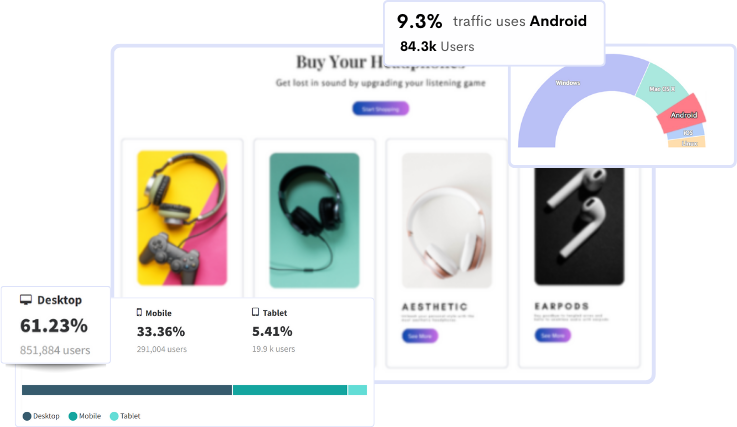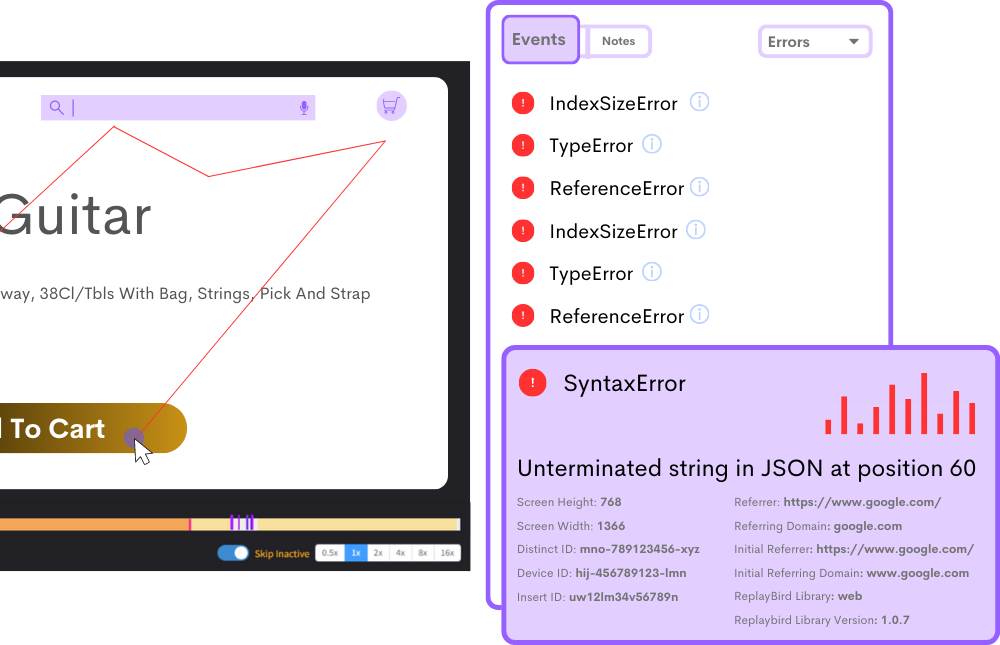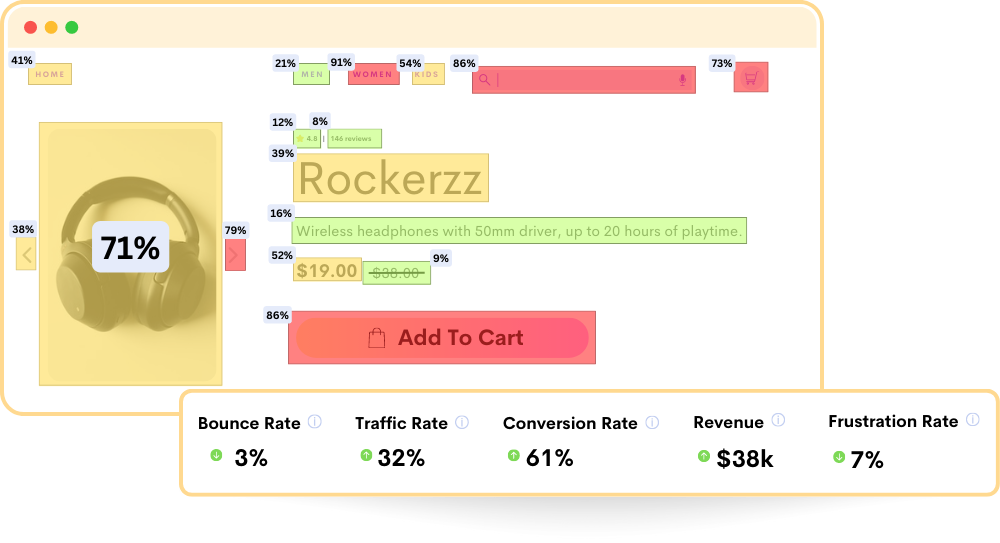
Marketing & E-commerce Insights on Potential Buyers
From monitoring product performance to analyzing customer information, ReplayBird helps e-commerce businesses identify growth opportunities, streamline DXP marketing strategies, and boost e-commerce and marketing revenue.
Benefits
 Save Time
Save Time Instantly capture and analyze behaviors as they happen in real-time.
 Enhanced User Experience
Enhanced User Experience Gain comprehensive customer insights for a complete understanding.
 Boost Revenue
Boost Revenue Identify emerging possibilities to drive revenue growth
 Customer Satisfaction
Customer Satisfaction Remove barriers and delight customers with effortless interactions.
 Pinpoint and Resolve Bugs
Pinpoint and Resolve Bugs Effectively address, troubleshoot, and resolve problems for prompt resolution.
 Privacy-Driven Integration
Privacy-Driven Integration Prioritize privacy and secure integration for driving continuous innovation.
Intuitive E-commerce Marketing Performance Analytics
Achieve a greater chance of users exploring deep into your e-commerce platform and more revenue-generating opportunities.

Detailed Journey Consolidation Across Every E-commerce Page
Gain deep insights that uncover user patterns and trends, enhancing your understanding of customers’ e-commerce needs and marketing expectations. Identify optimization opportunities by pinpointing journey stages or interactions causing friction or disengagement.

Watch Users Engage with Your E-commerce Website in Real-time
In-depth analysis of user behavior by capturing their interactions, mouse movements, clicks, and scrolling patterns. Analyzing session recordings can help e-commerce marketing teams understand how users navigate their websites, identify pain points, and increase opportunities to improve the end-user experience.
Get your free trial now!
Discover Optimal Spots for Your CTA Button to Boost Customer Conversions
Discover hotspots and cold spots by analyzing areas of high engagement for design enhancement and identifying low-engagement areas for targeted improvements. Build a more visually appealing UI that guides visitors towards desired actions, improving the user experience and conversion rates.
Go from insight to action
Conversion rate optimization
User engagement tracking
Customer support
App Analytics
Usability testing
Website tracking
UX design issues
Marketing funnels
Application debugging
Performance marketing
Product experience insights
Engagement patterns
Better Insights. Grow Faster.
Ready to understand your customer journeys like never before?
Frequently Asked Questions
- Sign up with ReplayBird by providing your website.
- Copy the tracking script from the Install Agent page.
- Follow the “Quick Installation Guide” to paste the tracking script into your website’s “index.html” file.
- Open your web app or website in your browser and load any of your updated pages. After a few minutes, the recording will appear in the recordings tab.
- caption: text
- Search Engine Optimization(SEO): Optimizing your website to rank higher in search engine results and attract organic traffic.
- Pay-Per-Click (PPC) Advertising: Running targeted ads on search engines and social media platforms to drive immediate traffic and conversions.
- Social Media Marketing: Leveraging popular social media platforms to build brand awareness, engage with your audience, and drive traffic to your website.
- Email Marketing: Sending personalized emails to your subscribers to nurture leads, promote products, and encourage repeat purchases.
- Content Marketing: Creating valuable and relevant content such as blog posts, articles, videos, and infographics to attract and engage your target audience.
- Influencer Marketing: Collaborating with influential individuals or bloggers in your industry to promote your products or services to their audience.
Implementing web analytics for e-commerce tools, tracking codes, and conversion tracking allows you to gather and analyze data to measure the impact of your digital marketing initiatives.
Consider leveraging the expertise of digital marketing professionals or agencies to ensure you have a solid strategy in place. From there, start implementing tactics such as SEO, social media marketing, paid advertising, and email marketing to drive traffic and conversions.
- Sales and Revenue Metrics: This includes tracking metrics such as total sales, average order value, conversion rate, and revenue generated. These metrics help evaluate the financial success of the e-commerce business.
- Conversion Funnel Analysis: Analyzing the conversion funnel allows you to identify drop-off points and optimize the user journey to improve conversion rates. Key metrics in the conversion funnel analysis include the number of visitors, add-to-cart rate, checkout abandonment rate, and completed transactions.
- Customer Acquisition and Retention: Understanding how customers are acquired and retained is crucial for e-commerce success. Metrics such as customer acquisition cost (CAC), customer lifetime value (CLV), and customer retention rate provide insights into the effectiveness of marketing and customer retention strategies.
- Traffic Sources and Channels: Analyzing traffic sources and channels helps identify which marketing efforts drive the most valuable traffic. Metrics such as organic search traffic, paid advertising performance, referral traffic, and social media engagement provide insights into the effectiveness of various marketing channels.
- Product Performance: Evaluating the performance of individual products or product categories helps identify popular items, low-performing products, and opportunities for cross-selling or upselling. Metrics include product page views, add-to-cart rates, conversion rates per product, and revenue by product.
- User Behavior and Engagement: Understanding how users interact with the website can provide valuable insights. Metrics such as bounce rate, average session duration, page views per session, and click-through rates help assess user engagement and website usability.
- Site Speed and Performance: Slow-loading websites can negatively impact user experience and conversions. Analyzing metrics such as page load times, server response times, and website uptime helps identify performance issues and optimize website speed.
- Cart Abandonment Analysis: Analyzing cart abandonment metrics helps understand why users abandon their carts and enable you to implement strategies to reduce abandonment rates. Metrics include the number of abandoned carts, reasons for abandonment, and recovery rate.
- Customer Satisfaction and Reviews: Monitoring customer satisfaction through feedback, reviews, and ratings provides insights into the overall customer experience and product quality. Analyzing customer reviews and ratings help identify areas for improvement and builds trust with potential customers.
By regularly analyzing and monitoring these e-commerce performance analytics, businesses can make data-driven decisions to optimize their website, marketing strategies, product offerings, and overall customer experience.
Try ReplayBird for free now
Free 14-day trial. No credit card required. Easy setup.